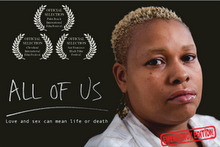I viewed All Of Us this evening and want to congratulate you for this important film. It is very much a teaching tool, but also more than that. It tells many stories, from that of the young African-American doctor to the black women in the Bronx and rural and urban America (like New Orleans), and the connection to Ethiopia where things are very much the same.
The outreach, training, messages for prevention and issues that are so important are addressed through facts and through the women who share their stories and experiences. As someone who has been going into classrooms and neighborhoods for 15 years talking about HIV prevention and sharing my own HIV story and information about needle exchange programs and counseling for addicts, I can attest that this film touches on all the facts about the underlying cause for HIV which is behavior. Low self-esteem is not just a black women's issue. Having worked with minority women and men, both straight and gay, I can say that this is a shame-based disease connected to low self-esteem. Whether they were estranged from their fathers or families, or beaten up by society, low self-esteem drives the connection between sexual behavior, drug abuse and HIV infection. It is a strong message and while in the film, it addresses black women specifically, it also connects the dots to the bigger picture. At least it did for me, but I'm always looking to see a big picture.
As a teaching tool, especially for young doctors, this film is most important, as it shows the personal relationship doctors can have with their HIV patients. Because HIV is often a chronic disease, the relationship with one's doctor can last for many, many years. Someone you see every 4 months, year after year, becomes your friend. This is unique to chronic illness, and also a sign of the times in a doctor's training. In the past, doctors were taught to keep a certain distance, a professional stance with their patient. This has changed, in my experience, with the doctors I have had over the past 23 years. I call my doctor here in L.A. by her first name and we e-mail frequently. My doctor back east and I still stay in touch and we look forward to seeing each other when I come into Boston where his practice is. These patient/doctor relationships are unique because of the generation of doctors today and the nature of chronic illness. I feel fortunate to have doctors like this. A new line of physician, not like the ones I grew up with or my parents had, but doctors who are humanized by their patients and allow themselves to be touched by their experience. In doing so, they become more compassionate care takers and their own lives are enriched. That is what Dr. Mehret expresses in her experience with her patient and is captured so eloquently in this film.
The film is also visually beautiful to watch. The choice of black and white photography in the beginning and the end brings the story full circle, and the color photography where life begins is full of warmth and light, telling stories about HIV, its hardships, tragedies and victories.
Thank you for sharing this film with me. After seeing this film, I feel it truly is about All of Us. Well done.
--Sherri Lewis, HIV/AIDS Activist, Hollywood, CA
Listen to Sherri's podcast, Straight Girl in a Queer World.
Read an article about Sherri in POZ magazine.
Wednesday, May 21, 2008
Subscribe to:
Posts (Atom)
